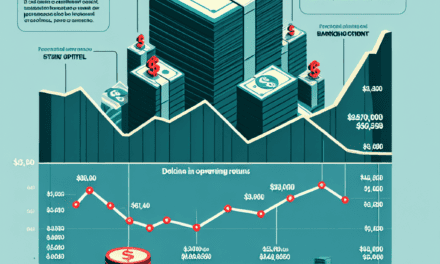“Trump’s Comeback: Fueling a Multitrillion-Dollar Market Boom”
Introduction
“Forecast: Trump’s Return to the White House Could Ignite a Multitrillion-Dollar Stock Surge” explores the potential economic implications of a second term for Donald Trump as President of the United States. The analysis delves into how Trump’s policies, known for their business-friendly orientation, could stimulate significant growth in the stock market. By examining historical market trends during his previous tenure, alongside proposed economic strategies, the forecast anticipates a substantial surge in market capitalization, potentially reaching multitrillion-dollar levels. This projection considers factors such as tax reforms, deregulation, and trade policies, which could collectively foster an environment conducive to robust market performance and investor confidence.
Economic Implications Of Trump’s Potential Return To The White House
The potential return of Donald Trump to the White House is a topic that has sparked considerable debate, not only in political circles but also among economic analysts and investors. The prospect of Trump’s re-election could have profound implications for the U.S. economy, particularly the stock market. Historically, Trump’s presidency was marked by a pro-business stance, characterized by tax cuts, deregulation, and a focus on boosting American industries. These policies were generally well-received by the financial markets, leading to significant stock market gains during his tenure. Consequently, the anticipation of a similar economic approach could ignite a multitrillion-dollar surge in the stock market.
To understand the potential economic implications of Trump’s return, it is essential to consider the policies that defined his previous administration. One of the most notable was the Tax Cuts and Jobs Act of 2017, which reduced the corporate tax rate from 35% to 21%. This move was instrumental in increasing corporate profits, thereby driving up stock prices. If Trump were to return to the White House, investors might expect a continuation or even an expansion of such tax policies, which could further enhance corporate earnings and, by extension, stock valuations.
Moreover, Trump’s emphasis on deregulation played a crucial role in fostering a business-friendly environment. By reducing regulatory burdens, particularly in sectors such as energy and finance, companies were able to operate with greater efficiency and profitability. A potential second term could see a resurgence of these deregulatory efforts, potentially leading to increased investment and growth in key industries. This, in turn, could contribute to a bullish sentiment in the stock market, as investors anticipate higher returns from a more liberated business landscape.
In addition to tax cuts and deregulation, Trump’s trade policies could also influence market dynamics. His administration’s approach to trade was characterized by a focus on renegotiating trade deals to favor American interests, as seen in the United States-Mexico-Canada Agreement (USMCA). While some of these policies were controversial, they were aimed at protecting domestic industries and jobs. A return to such trade policies could bolster certain sectors of the economy, particularly manufacturing and agriculture, potentially leading to increased investor confidence and stock market gains.
However, it is important to acknowledge the potential risks and uncertainties associated with Trump’s return. His administration was also marked by significant volatility, partly due to unpredictable policy announcements and geopolitical tensions. Such factors could introduce elements of uncertainty into the market, potentially leading to increased volatility. Investors would need to weigh the potential benefits of pro-business policies against the risks of policy unpredictability and geopolitical challenges.
In conclusion, the prospect of Donald Trump’s return to the White House carries significant economic implications, particularly for the stock market. His previous administration’s focus on tax cuts, deregulation, and trade policies contributed to substantial market gains, and a similar approach could potentially ignite a multitrillion-dollar surge. However, investors must also consider the potential risks associated with policy volatility and geopolitical tensions. As the political landscape evolves, market participants will closely monitor developments, seeking to position themselves advantageously in anticipation of potential economic shifts. Ultimately, the intersection of politics and economics will play a crucial role in shaping the future trajectory of the stock market.
Stock Market Predictions: How Trump’s Policies Could Influence Growth
As the political landscape in the United States continues to evolve, investors and market analysts are keenly observing the potential implications of a possible return of Donald Trump to the White House. The prospect of Trump’s re-election has sparked discussions about the potential impact on the stock market, with some experts predicting a multitrillion-dollar surge. This forecast is rooted in the economic policies and regulatory approaches that characterized Trump’s previous administration, which many believe could once again influence market dynamics.
During his first term, Trump implemented a series of tax cuts and deregulation measures that were largely viewed as pro-business. These policies contributed to a bullish stock market, with major indices reaching record highs. The Tax Cuts and Jobs Act of 2017, for instance, reduced the corporate tax rate from 35% to 21%, significantly boosting corporate profits and, consequently, stock prices. If Trump were to return to office, it is anticipated that similar fiscal policies could be reinstated, potentially leading to another wave of market optimism.
Moreover, Trump’s approach to deregulation, particularly in sectors such as energy, finance, and healthcare, could further stimulate market growth. By reducing regulatory burdens, companies in these industries might experience increased profitability, which could translate into higher stock valuations. Investors often respond positively to such environments, as they tend to favor conditions that enhance corporate earnings potential. Therefore, a Trump presidency could reignite investor confidence, driving substantial capital inflows into the stock market.
In addition to domestic policies, Trump’s stance on international trade could also play a pivotal role in shaping market outcomes. His administration was known for its aggressive trade policies, including the renegotiation of trade agreements and the imposition of tariffs on certain imports. While these measures were controversial, they were aimed at protecting American industries and promoting domestic economic growth. A return to such policies might bolster certain sectors, particularly manufacturing and agriculture, potentially leading to increased stock valuations in these areas.
However, it is important to consider the potential risks and uncertainties associated with a Trump presidency. While some investors may welcome the prospect of tax cuts and deregulation, others may be wary of the geopolitical tensions and trade disputes that characterized his previous term. These factors could introduce volatility into the market, as investors weigh the benefits of pro-business policies against the potential for international conflict and economic disruption.
Furthermore, the broader economic context in which a Trump presidency would unfold cannot be overlooked. The global economy is currently navigating challenges such as inflation, supply chain disruptions, and shifting monetary policies. These factors could influence the extent to which Trump’s policies might impact the stock market. For instance, while tax cuts could stimulate growth, they might also exacerbate inflationary pressures, prompting central banks to tighten monetary policy, which could, in turn, affect market performance.
In conclusion, the potential return of Donald Trump to the White House presents a complex scenario for the stock market. While his pro-business policies could ignite a multitrillion-dollar surge, investors must also consider the accompanying risks and uncertainties. As the political landscape continues to unfold, market participants will need to remain vigilant, balancing optimism with caution as they navigate the potential implications of a Trump presidency on the financial markets.
Analyzing The Multitrillion-Dollar Surge: Factors And Forecasts
The prospect of Donald Trump returning to the White House has sparked considerable debate among economists and financial analysts, with many speculating on the potential impact such a political shift could have on the stock market. Historically, presidential elections have been pivotal moments for financial markets, often leading to significant fluctuations based on investor sentiment and policy expectations. In the case of a Trump return, several factors could contribute to a multitrillion-dollar surge in the stock market, driven by anticipated policy changes, investor confidence, and economic growth projections.
To begin with, Trump’s previous tenure as President was marked by a series of pro-business policies, including tax cuts and deregulation, which were largely credited with boosting corporate profits and stock valuations. Should Trump return to office, it is likely that similar policies would be reinstated or expanded, potentially leading to increased corporate earnings and, consequently, higher stock prices. Moreover, Trump’s focus on reducing regulatory burdens could further enhance business operations, particularly in sectors such as energy, finance, and manufacturing, which are often heavily regulated. This anticipated regulatory relief could encourage investment and expansion, thereby driving stock market growth.
In addition to policy considerations, investor sentiment plays a crucial role in market dynamics. Trump’s presidency was characterized by a strong emphasis on economic growth and job creation, which resonated with many investors. A return to such a focus could bolster investor confidence, leading to increased market participation and capital inflows. Furthermore, Trump’s ability to communicate directly with the public and influence market perceptions through social media and other platforms could also contribute to a more optimistic market outlook, potentially fueling a stock surge.
Another factor to consider is the potential impact of Trump’s trade policies. During his previous administration, Trump pursued a more protectionist trade agenda, renegotiating trade deals and imposing tariffs on certain imports. While these measures were controversial, they were also aimed at protecting domestic industries and promoting American manufacturing. A return to such policies could benefit certain sectors of the economy, leading to increased stock valuations for companies within those industries. However, it is important to note that trade policies can also introduce volatility and uncertainty, which could temper some of the anticipated market gains.
Moreover, the broader economic context cannot be overlooked. The global economy is currently navigating a complex landscape, characterized by challenges such as inflation, supply chain disruptions, and geopolitical tensions. A Trump presidency could influence these dynamics in various ways, potentially impacting global trade relations and economic stability. While some analysts argue that Trump’s approach could exacerbate existing tensions, others believe that his focus on economic growth and national interests could lead to more favorable outcomes for the U.S. economy, thereby supporting a stock market surge.
In conclusion, the potential return of Donald Trump to the White House presents a multifaceted scenario for the stock market, with several factors contributing to the possibility of a multitrillion-dollar surge. While pro-business policies, investor confidence, and trade strategies are likely to play significant roles, the broader economic context and global dynamics will also be critical in shaping market outcomes. As such, investors and analysts will need to closely monitor these developments, weighing the potential benefits against the inherent risks and uncertainties associated with a Trump presidency.
Investor Sentiment: The Trump Effect On Market Confidence
Investor sentiment plays a crucial role in shaping market dynamics, and the potential return of Donald Trump to the White House could significantly influence this sentiment, potentially igniting a multitrillion-dollar stock surge. Historically, Trump’s presidency was marked by a pro-business stance, characterized by tax cuts, deregulation, and policies aimed at stimulating economic growth. These measures were generally well-received by investors, contributing to a bullish stock market during his tenure. As such, the prospect of his return could rekindle similar investor enthusiasm, driving market confidence to new heights.
To understand the potential impact of Trump’s return on investor sentiment, it is essential to consider the policies that defined his previous administration. The Tax Cuts and Jobs Act of 2017, for instance, lowered corporate tax rates, thereby increasing after-tax profits for companies. This policy not only boosted corporate earnings but also encouraged business investments, which in turn fueled stock market growth. Investors, anticipating a similar policy environment under a renewed Trump administration, might be inclined to increase their exposure to equities, expecting favorable conditions for corporate profitability.
Moreover, Trump’s approach to deregulation was another factor that bolstered investor confidence. By reducing regulatory burdens on industries such as energy, finance, and manufacturing, his administration created an environment conducive to business expansion and innovation. Should Trump return to the White House, investors might anticipate a resurgence of such policies, potentially leading to increased market activity and a surge in stock valuations. This expectation could be particularly pronounced in sectors that benefited most from deregulation during his previous term.
In addition to policy considerations, Trump’s potential return could also influence investor sentiment through his impact on consumer confidence. During his presidency, consumer confidence indices often reflected optimism about economic prospects, driven by low unemployment rates and robust economic growth. A similar boost in consumer confidence could be expected if Trump were to return, as his administration might prioritize job creation and economic expansion. This, in turn, could lead to increased consumer spending, further stimulating economic activity and enhancing corporate earnings, thereby positively affecting stock prices.
However, it is important to acknowledge that the potential return of Trump to the White House is not without its uncertainties. Geopolitical tensions, trade policies, and domestic political dynamics could all play a role in shaping investor sentiment. For instance, Trump’s approach to international trade, characterized by tariffs and renegotiated trade agreements, had mixed effects on different sectors. While some industries benefited from protective measures, others faced challenges due to retaliatory tariffs and disrupted supply chains. Investors would need to weigh these factors carefully when assessing the potential impact of a Trump presidency on the stock market.
In conclusion, the prospect of Donald Trump’s return to the White House holds the potential to significantly influence investor sentiment, possibly igniting a multitrillion-dollar stock surge. By considering the policies and economic conditions that characterized his previous administration, investors might anticipate a favorable environment for corporate profitability and market growth. Nevertheless, it is crucial to remain mindful of the complexities and uncertainties that could accompany such a political shift. As investors navigate these dynamics, their sentiment will undoubtedly play a pivotal role in shaping the future trajectory of the stock market.
Comparing Past And Future: Trump’s Economic Impact On Wall Street
The potential return of Donald Trump to the White House has sparked considerable debate among economists and investors alike, with many speculating on the possible implications for Wall Street. Historically, Trump’s presidency was marked by a series of economic policies that significantly impacted the stock market, and a second term could potentially ignite a multitrillion-dollar surge. To understand this potential future, it is essential to compare past economic impacts with the anticipated effects of his policies.
During Trump’s first term, the stock market experienced substantial growth, driven by a combination of tax cuts, deregulation, and a pro-business agenda. The Tax Cuts and Jobs Act of 2017, which reduced the corporate tax rate from 35% to 21%, was a pivotal factor in boosting corporate profits and, consequently, stock prices. This legislative change provided companies with increased capital to reinvest in their operations, pay dividends, and buy back shares, all of which contributed to a bullish market environment. Furthermore, Trump’s focus on deregulation, particularly in the financial and energy sectors, removed barriers that had previously hindered growth, thereby fostering a more favorable climate for investment.
In addition to these domestic policies, Trump’s approach to international trade also played a significant role in shaping market dynamics. His administration’s renegotiation of trade agreements, such as the United States-Mexico-Canada Agreement (USMCA), aimed to create more equitable terms for American businesses. While the imposition of tariffs on Chinese goods initially led to market volatility, the eventual trade agreements were perceived as beneficial for U.S. industries, further bolstering investor confidence.
Looking ahead, a potential second term for Trump could see a continuation or even an intensification of these policies. Investors might anticipate further tax cuts or incentives aimed at stimulating economic growth, which could lead to increased corporate earnings and higher stock valuations. Additionally, Trump’s emphasis on infrastructure development, which was a recurring theme during his first term, could gain renewed focus. Such initiatives would likely require significant investment, potentially creating opportunities for growth in sectors such as construction, manufacturing, and technology.
Moreover, Trump’s stance on energy independence and support for traditional energy sectors could lead to increased investment in oil, gas, and coal industries. This focus on energy could also extend to renewable sources, as the global shift towards sustainable practices continues to gain momentum. By balancing traditional and renewable energy investments, Trump’s policies could attract a diverse range of investors, further driving market growth.
However, it is crucial to consider the potential risks associated with a Trump presidency. Geopolitical tensions, particularly with China, could resurface, leading to market uncertainty. Additionally, the impact of Trump’s policies on income inequality and social issues could create domestic challenges that might affect investor sentiment.
In conclusion, while the prospect of Trump’s return to the White House presents opportunities for a multitrillion-dollar stock surge, it is essential to weigh these potential gains against the associated risks. By examining the past economic impacts of Trump’s policies and considering their future implications, investors can better navigate the complexities of a market influenced by political dynamics. As with any investment strategy, a balanced approach that considers both opportunities and challenges will be key to capitalizing on the potential economic impact of a Trump presidency on Wall Street.
Key Sectors Poised For Growth Under A Trump Administration
As the political landscape in the United States continues to evolve, the potential return of Donald Trump to the White House is a topic of considerable interest, particularly among investors and financial analysts. The prospect of a Trump administration once again steering the nation’s economic policies could have significant implications for various sectors of the stock market. Historically, Trump’s presidency was marked by a focus on deregulation, tax cuts, and a pro-business agenda, which collectively contributed to a bullish stock market environment. Should Trump return to office, several key sectors are poised for substantial growth, potentially igniting a multitrillion-dollar surge in the stock market.
To begin with, the energy sector stands to benefit significantly from a Trump administration. During his previous term, Trump prioritized energy independence and supported the expansion of fossil fuel production. This approach included rolling back environmental regulations and promoting the development of oil, natural gas, and coal industries. A renewed focus on these policies could lead to increased investment in traditional energy sources, driving up stock prices for companies within this sector. Moreover, Trump’s stance on reducing regulatory burdens could further enhance the profitability of energy firms, making them attractive to investors seeking growth opportunities.
In addition to energy, the financial sector could experience a resurgence under Trump’s leadership. His administration previously enacted policies aimed at reducing the regulatory constraints imposed on banks and financial institutions. By advocating for a more lenient regulatory environment, Trump could facilitate greater lending and investment activities, thereby boosting the profitability of financial firms. This potential deregulation, coupled with tax policies favoring corporate growth, might lead to a robust performance in the stock market, particularly for banks and other financial entities.
Furthermore, the defense and aerospace sectors are likely to see increased government spending under a Trump administration. Trump’s emphasis on strengthening national security and military capabilities was a hallmark of his previous term. Should he return to office, it is reasonable to anticipate a continuation of this trend, with increased defense budgets and contracts for defense contractors. This influx of government spending could translate into higher revenues and stock valuations for companies operating within these industries, making them attractive investment opportunities.
Moreover, the construction and infrastructure sectors could also witness significant growth. Trump’s previous focus on infrastructure development, including plans for rebuilding and modernizing the nation’s roads, bridges, and airports, suggests that these sectors could benefit from increased government investment. Such initiatives would not only create jobs but also stimulate economic activity, potentially leading to higher stock prices for companies involved in construction and infrastructure projects.
In conclusion, the potential return of Donald Trump to the White House presents a unique set of opportunities for various sectors within the stock market. By prioritizing deregulation, tax cuts, and increased government spending in key areas, a Trump administration could create a favorable environment for growth across multiple industries. As investors and analysts consider the implications of this political shift, it is essential to recognize the potential for a multitrillion-dollar stock surge driven by strategic investments in energy, finance, defense, and infrastructure. While the future remains uncertain, the prospect of Trump’s return to power offers a compelling narrative for those seeking to capitalize on emerging market trends.
Risks And Opportunities: Navigating The Market Amid Political Change
As the political landscape in the United States continues to evolve, investors are keenly observing the potential implications of a possible return of Donald Trump to the White House. Such a scenario could have profound effects on the financial markets, potentially igniting a multitrillion-dollar surge in stock valuations. However, navigating this environment requires a nuanced understanding of both the risks and opportunities that accompany political change.
To begin with, the prospect of Trump’s return to the presidency is likely to be met with a mix of optimism and caution by market participants. On one hand, Trump’s previous tenure was marked by policies that were generally favorable to businesses, including tax cuts and deregulation. These measures contributed to a bullish stock market, with major indices reaching record highs. Investors may anticipate a similar trajectory should Trump regain office, expecting a continuation or expansion of pro-business policies that could stimulate economic growth and, by extension, stock market performance.
Moreover, Trump’s approach to international trade, particularly his stance on China, could also play a significant role in shaping market dynamics. While his administration’s trade policies were often contentious, they were aimed at leveling the playing field for American businesses. A return to such policies might be perceived as beneficial for certain sectors, particularly manufacturing and technology, which could see increased domestic investment and production. This potential for sector-specific growth could attract investors looking to capitalize on these opportunities.
However, it is crucial to acknowledge the inherent risks associated with political transitions. The uncertainty surrounding policy changes can lead to market volatility, as investors attempt to predict and react to new developments. For instance, while tax cuts and deregulation may boost corporate profits, they could also lead to concerns about fiscal deficits and long-term economic sustainability. Additionally, aggressive trade policies might provoke retaliatory measures from other countries, potentially disrupting global supply chains and affecting market stability.
Furthermore, the broader geopolitical landscape must be considered. Trump’s foreign policy decisions, particularly in relation to NATO, the Middle East, and North Korea, could have far-reaching implications for global markets. Investors must remain vigilant, as shifts in international relations could impact everything from energy prices to defense stocks. The interconnectedness of global economies means that political decisions in the United States can reverberate across the world, influencing investor sentiment and market trends.
In light of these complexities, investors should adopt a strategic approach to navigating the market amid potential political change. Diversification remains a key strategy, allowing investors to spread risk across various asset classes and sectors. Additionally, staying informed about policy developments and their potential market impacts is essential for making informed investment decisions. Engaging with financial advisors and leveraging analytical tools can also provide valuable insights into market trends and help mitigate risks.
In conclusion, while the prospect of Trump’s return to the White House presents opportunities for a significant stock market surge, it is accompanied by a range of risks that must be carefully managed. By understanding the interplay between political decisions and market dynamics, investors can position themselves to capitalize on potential gains while safeguarding against volatility. As the political narrative unfolds, maintaining a balanced perspective will be crucial for navigating the complexities of the financial markets.
Q&A
1. **Question:** What is the main prediction discussed in the article?
– **Answer:** The article predicts that Donald Trump’s return to the White House could lead to a multitrillion-dollar surge in the stock market.
2. **Question:** What factors are believed to contribute to the potential stock market surge?
– **Answer:** Factors may include anticipated tax cuts, deregulation, and pro-business policies that could boost investor confidence and economic growth.
3. **Question:** How might Trump’s policies impact specific sectors of the stock market?
– **Answer:** Sectors such as energy, finance, and manufacturing might benefit from deregulation and favorable policies, potentially leading to significant gains.
4. **Question:** What are some potential risks or downsides mentioned in the forecast?
– **Answer:** Potential risks include increased political uncertainty, trade tensions, and the possibility of policy reversals that could create market volatility.
5. **Question:** How do analysts view the likelihood of Trump’s return affecting the stock market?
– **Answer:** Analysts may have mixed views, with some optimistic about the potential for growth and others cautious about the risks and uncertainties involved.
6. **Question:** What historical precedents are referenced to support the forecast?
– **Answer:** The article might reference past market performances during Trump’s previous term, highlighting periods of growth following tax cuts and deregulation.
7. **Question:** Are there any specific companies or industries highlighted as potential beneficiaries?
– **Answer:** Specific companies or industries likely to benefit could include those in fossil fuels, financial services, and construction, due to expected policy support.
Conclusion
A potential return of Donald Trump to the White House could lead to significant shifts in economic policy, potentially sparking a multitrillion-dollar surge in the stock market. This forecast hinges on expectations of tax cuts, deregulation, and pro-business policies that characterized his previous administration. Such measures could boost corporate profits and investor confidence, driving stock prices higher. However, this outlook also depends on various factors, including geopolitical stability, domestic economic conditions, and the broader global market environment. While the prospect of a stock surge is enticing, investors should remain cautious and consider the inherent uncertainties and risks associated with political and economic changes.





